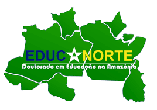Banca de QUALIFICAÇÃO: JEYSE SUNAYA ALMEIDA DE VASCONCELOS
Uma banca de QUALIFICAÇÃO de DOUTORADO foi cadastrada pelo programa.STUDENT : JEYSE SUNAYA ALMEIDA DE VASCONCELOS
DATE: 19/12/2023
TIME: 14:00
LOCAL: Plataforma Google Meet
TITLE:
“WE KNOW THE LESSON BY MEMORY, WE JUST HAVE TO LEARN IT”
The challenges and possibilities of making interactions and games the guiding principles of the curriculum of a preschool class at a Municipal Early Childhood Education Center in Santarém-PA.
KEY WORDS:
Make – believe activities. Curriculum. Child education.
PAGES: 102
BIG AREA: Ciências Humanas
AREA: Educação
SUBÁREA: Tópicos Específicos de Educação
SPECIALTY: Educação Pré-Escolar
SUMMARY:
This research's main objective is to understand the challenges and possibilities of making interactions and games the guiding principles of the curriculum of a preschool class at a Municipal Early Childhood Education Center in Santarém-PA. As a methodological approach, we chose to observe the pedagogical practice of a teacher, regarding the organization of the educational social environment to promote pretend play, a guiding activity for preschool children. For this, specifically, it is proposed: Elucidate what it means to have interactions and play as guiding axes of the curriculum in early childhood education, with an emphasis on the activity that guides the development of pre-school children; Check the quality level of interactions and games experienced by children at school; Point out challenges and possibilities to carry out pretend play as a guiding axis for the teacher's pedagogical planning. The study is based on the theoretical-methodological principles of the Historical-Cultural Theory (THC) of Vygotski and collaborators, recognizing the importance of the environment and the relationships established within it as factors of human constitution and development. In search of achieving the aforementioned objectives, we outlined some methodological paths that have been followed until the moment of the investigation: the explanatory nature of the object studied, in search of its essence, escaping from immediate appearances and the interventional-collaborative nature of the research, which was carried out through continued training and monitoring of the teacher's pedagogical practice throughout 2022. The data production strategies are structured in observation, semi-structured interviews, a questionnaire applied to the children's families and the analysis of the pedagogical practice of the teacher. teacher, regarding the organization of the educational social environment of the class participating in the research, throughout the investigation, before and during the intervention. The forms of recording this data are supported by the field diary, videos and photographs. The partial results that we now present were based on the analysis of some of the data produced in the first observations (exploratory period), and the training period. The information from the exploratory period revealed, in general, that the teacher allocated little space and time for games and interactions.When the children played, the teacher was busy doing other tasks that she considered more important, or simply “observed” the binqcdaira without any intervention. Practices with transmissive tendencies were observed, focused on their commands and mainly aimed at the cognitive development of children. Thus, we assume that the teacher's concern was to develop the children's intellectual aspect and disciplined behavior, which contributed to an “authoritarian” and little interactive practice. And the joke? Where and when did the children play? We identified that the toys/objects were always suspended at the top of the shelves and were released, most of the time, as a reward for behavior considered appropriate by the teacher or when they needed to fill some time in the routine. Continuing training, used by us as a strategy to improve the teacher's pedagogical practice, made important changes possible. She began to better understand, among other aspects of teaching practice, her role in the guiding activity of child development, as proposed by Vygotsky, she began to plan with children and consider play as a pedagogical activity. Thus, we note that the teacher training process, both initial and continued, has been a major challenge to be overcome so that these professionals see themselves as intellectuals of their own practices, which they carry out important role in the process of human formation of young children.
COMMITTEE MEMBERS:
Presidente - 1965707 - SINARA ALMEIDA DA COSTA
Interna - ***.580.402-** - JURACY MACHADO PACÍFICO - UNIR
Interna - 1278761 - SOLANGE HELENA XIMENES ROCHA
Externa ao Programa - 1552900 - IANI DIAS LAUER LEITE - UFOPAExterno à Instituição - SUZANA MARCOLINO - UFAL
Externa à Instituição - ROSIMEIRE COSTA DE ANDRADE CRUZ - UFC




